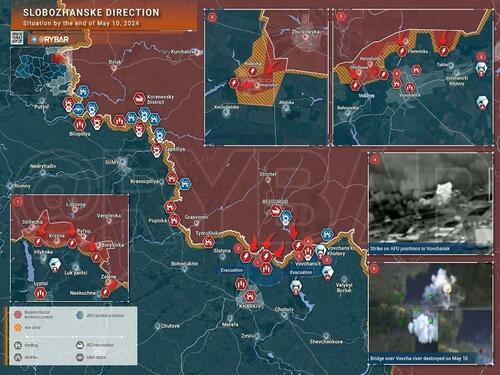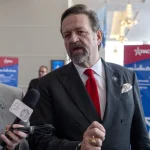
By Andrew Korybko of the Korybko substack
The five objectives that are enumerated in this piece encapsulate what Russia nowadays aims to achieve after over two years of intense proxy warfare with NATO.
Zelensky claimed on Friday that Russia’s long-awaited offensive had finally begun following its fresh push into Kharkov Region from which it tactically pulled back in September 2022. This precedes him likely clinging to power on legally dubious pretexts once his term expires on 21 May and aligns with the Ukrainian Intelligence Committee’s prediction of political-military troubles heading into his summer.
Here are the five objectives that Russia arguably aims to achieve in view of the conflict’s larger context:
1. Create The Conditions For Russia To Control The Entirety Of Its New Regions
Russia’s increasingly frequent gains in Donbass over the past month speak to how serious Ukraine’s conscription and logistical crises have become, thus enabling Moscow to push them to the breaking point by opening up a new front at this precise moment in time. This is meant to facilitate a military breakthrough for expelling Ukrainian forces from the entirety of Russia’s new regions, with any collapse of the front lines consequently paving the way for achieving additional military-political goals.
2. Coerce Ukraine Into Demilitarizing All Of Its Rump Regions East Of The Dnieper
Russia is unlikely to make territorial claims to Ukraine’s rump regions east of the Dnieper due to the high cost of sustainably securing, rebuilding, and integrating them, which is why it’ll probably instead demand their demilitarization as a buffer zone in exchange for letting Kiev retain political control. Any areas that it captures throughout the course of this reportedly launched campaign could be handed back upon that happening in a variation of the alleged compromises contained in spring 2022’s draft treaty.
3. Deter NATO From Crossing The Dnieper If Member States’ Forces Conventionally Intervene
Russia doesn’t want NATO conventionally intervening in this conflict, but if member states like France and/or Poland unilaterally do so in the event that the front lines collapse, then Moscow hopes that its newly announced tactical nuclear weapons exercises will deter them from crossing the Dnieper. In connection with that, India and/or the Vatican could convey Russia’s red line to NATO, while Russia could restrain itself from chasing fleeing troops to and over the river so as to not worsen the security dilemma.
4. Influence Ukraine’s Possibly Impending US-Backed Regime Change Process
The Kremlin won’t negotiate with Zelensky, Poroshenko, or any of the other Ukrainian figures that were just placed on its Interior Ministry’s wanted list since it regards them as illegitimate so the US couldn’t freeze the conflict without someone else in power. Russia’s foreign intelligence service recently reported that the US is already exploring possible replacements to Zelensky, and Moscow naturally wants to influence this process in order to filter out figures who it knows wouldn’t abide by any peace agreement.
5. End The Conflict In A Way That Ensures Russia’s Core Security Interests In The New Reality
Russia’s maximalist goals of demilitarizing Ukraine, denazifying it, and restoring that country’s constitutional neutrality are unlikely to be achieved in full given the new reality of NATO preparing for a conventional intervention up to the Dnieper in order to avoid a strategic defeat in this proxy war. Considering that, Russia must resort to creative military-diplomatic means for ensuring its core security interests, though that requires an information campaign for tempering its supporters’ expectations.
----------
As argued above, Russia’s fresh push into Kharkov Region is intended to end this conflict by year’s end in the best-case scenario, though that of course can’t be taken for granted given the fog of war and innumerable variables that the public isn’t privy to. Nevertheless, the five objectives that were enumerated in this piece encapsulate what it nowadays aims to achieve after over two years of intense proxy warfare with NATO, which might lead to some observers recalibrating their analyses.
By Andrew Korybko of the Korybko substack
The five objectives that are enumerated in this piece encapsulate what Russia nowadays aims to achieve after over two years of intense proxy warfare with NATO.
Zelensky claimed on Friday that Russia’s long-awaited offensive had finally begun following its fresh push into Kharkov Region from which it tactically pulled back in September 2022. This precedes him likely clinging to power on legally dubious pretexts once his term expires on 21 May and aligns with the Ukrainian Intelligence Committee’s prediction of political-military troubles heading into his summer.
Here are the five objectives that Russia arguably aims to achieve in view of the conflict’s larger context:
1. Create The Conditions For Russia To Control The Entirety Of Its New Regions
Russia’s increasingly frequent gains in Donbass over the past month speak to how serious Ukraine’s conscription and logistical crises have become, thus enabling Moscow to push them to the breaking point by opening up a new front at this precise moment in time. This is meant to facilitate a military breakthrough for expelling Ukrainian forces from the entirety of Russia’s new regions, with any collapse of the front lines consequently paving the way for achieving additional military-political goals.
2. Coerce Ukraine Into Demilitarizing All Of Its Rump Regions East Of The Dnieper
Russia is unlikely to make territorial claims to Ukraine’s rump regions east of the Dnieper due to the high cost of sustainably securing, rebuilding, and integrating them, which is why it’ll probably instead demand their demilitarization as a buffer zone in exchange for letting Kiev retain political control. Any areas that it captures throughout the course of this reportedly launched campaign could be handed back upon that happening in a variation of the alleged compromises contained in spring 2022’s draft treaty.
3. Deter NATO From Crossing The Dnieper If Member States’ Forces Conventionally Intervene
Russia doesn’t want NATO conventionally intervening in this conflict, but if member states like France and/or Poland unilaterally do so in the event that the front lines collapse, then Moscow hopes that its newly announced tactical nuclear weapons exercises will deter them from crossing the Dnieper. In connection with that, India and/or the Vatican could convey Russia’s red line to NATO, while Russia could restrain itself from chasing fleeing troops to and over the river so as to not worsen the security dilemma.
4. Influence Ukraine’s Possibly Impending US-Backed Regime Change Process
The Kremlin won’t negotiate with Zelensky, Poroshenko, or any of the other Ukrainian figures that were just placed on its Interior Ministry’s wanted list since it regards them as illegitimate so the US couldn’t freeze the conflict without someone else in power. Russia’s foreign intelligence service recently reported that the US is already exploring possible replacements to Zelensky, and Moscow naturally wants to influence this process in order to filter out figures who it knows wouldn’t abide by any peace agreement.
5. End The Conflict In A Way That Ensures Russia’s Core Security Interests In The New Reality
Russia’s maximalist goals of demilitarizing Ukraine, denazifying it, and restoring that country’s constitutional neutrality are unlikely to be achieved in full given the new reality of NATO preparing for a conventional intervention up to the Dnieper in order to avoid a strategic defeat in this proxy war. Considering that, Russia must resort to creative military-diplomatic means for ensuring its core security interests, though that requires an information campaign for tempering its supporters’ expectations.
———-
As argued above, Russia’s fresh push into Kharkov Region is intended to end this conflict by year’s end in the best-case scenario, though that of course can’t be taken for granted given the fog of war and innumerable variables that the public isn’t privy to. Nevertheless, the five objectives that were enumerated in this piece encapsulate what it nowadays aims to achieve after over two years of intense proxy warfare with NATO, which might lead to some observers recalibrating their analyses.
Loading…





